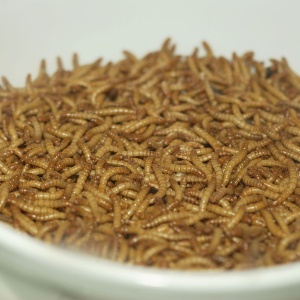
This paper explores attitudes towards eating insects, based on a online survey of Finnish consumers. It finds that both vegetarians and omnivores are more likely than vegans to consider eating food made from insects.
The paper notes that vegans view the concept of responsibility differently to non-vegan vegetarians and omnivores. Vegans were more likely to view not eating insects as responsible because of ethical considerations, while the other groups were more likely to view eating insects as responsible on the grounds of sustainability.
Abstract
Background: Consumption of foods of insect origin is encouraged, since insect consumption is seen as one of the responses to the environmental impact of meat production. This study examines the attitude (A), subjective norm (SN), perceived behavioral control (PC), and food neophobia (FN) toward the consumption of foods of insect origin, as well as the conditions for eating insect-based foods among vegans, vegetarians, and omnivores. Methods: The data was obtained by using an online survey and convenience sampling (n = 567, of whom omnivores represented 74%, vegans 5%, and non-vegan vegetarians 22%). Results: The three dietary groups exhibited significantly different intention (I) to eat foods of insect origin. Vegans held the most rigid negative attitude (A), and their subjective norm (SN) to eat insects was weaker compared to that of omnivores (p < 0.001) and non-vegan vegetarians (p < 0.001). Vegans’ perceived behavioral control (PC) over their eating of insects was stronger compared to that of omnivores (p < 0.001) and non-vegan vegetarians p < 0.001), and they were more neophobic than omnivores (p < 0.001) and non-vegan vegetarians (p < 0.001). Non-vegan vegetarians held the most positive attitude toward eating insects, and both non-vegan vegetarians and omnivores thought that insect consumption is wise and offers a solution to the world’s nutrition problems. In contrast, vegans regarded insect consumption as immoral and irresponsible. Conclusions: Vegans’ weak intention, negative attitude, and low willingness to eat insects in the future exhibit their different dietarian identity compared to that of omnivores and non-vegan vegetarians.
Reference
Elorinne, A.-L., Niva, M., Vartiainen, O. and Väisänen, P., 2019. Insect Consumption Attitudes among Vegans, Non-Vegan Vegetarians, and Omnivores. Nutrients, 11(2), p. 292.
Read the full paper here. See also the Foodsource resource Which diets generate fewer GHG emissions and other environmental impacts? and the insects keyword in the FCRN’s Research Library.







Post a new comment »